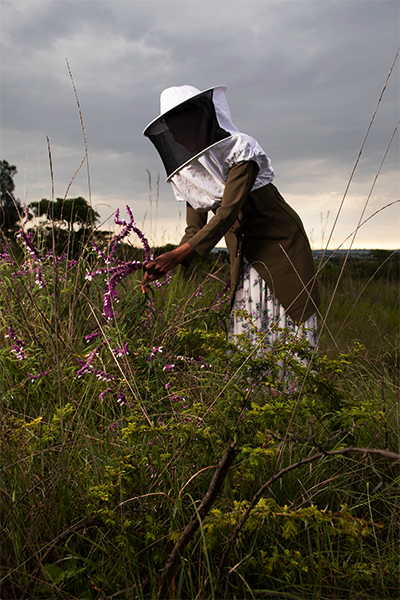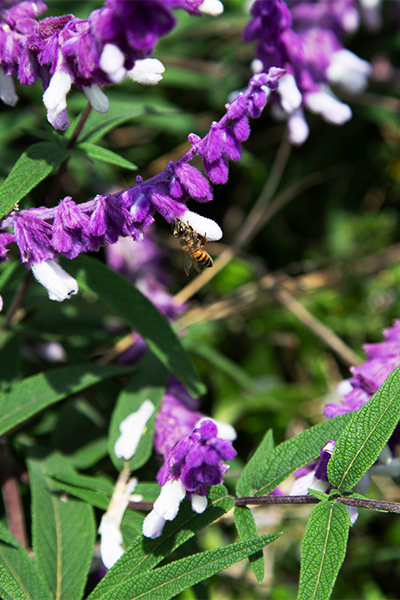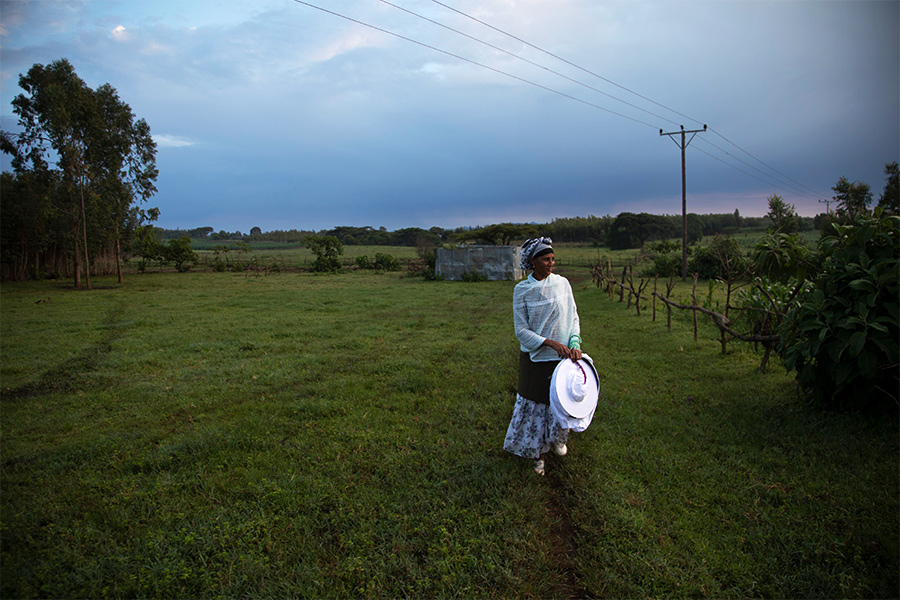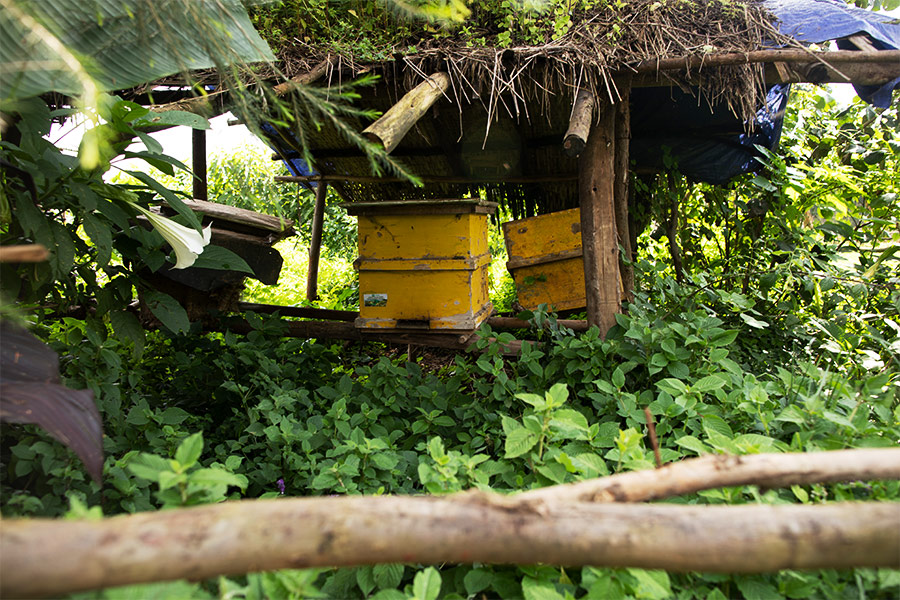Meet the female beekeepers of Ethiopia
We travel to Amhara to meet the queen bees of the country’s honey business
As dawn breaks on the Amhara highlands, sunlight streams through low cloud and lights up a lush green patchwork of fields framed by natural forests, all punctuated by blooming violet, yellow and white flowers. Four female beekeepers tend their hives, white veils shielding them from the insects’ sting. The humming of the bees is unmistakable, a low din that is constant and industrious.
The Ethiopian beekeeping industry produces about 25 per cent of all African honey and is one of the largest worldwide. It stretches back to almost 3500BC, and today, even in urban areas, Ethiopians have hives in their gardens for personal consumption.
But seeing female beekeepers at work is a fairly new sight. For generations, apiculture was men’s business.

Successful beekeeper Sashe Fekadu

The bees feast on a rich variety of nectar
The traditional cylindrical beehives were suspended from trees, and men had to climb up to harvest the honey. Recently however, box hives have been introduced to the country, and because these sit on the ground, women can more easily access them. Beekeeping has thus become a sideline for ever more women in rural communities.
In the village of Bacha just outside the bustling town of Dangla in the Amhara Region, a collective is finding out how empowering honey-making can be. This small community of 50 inhabitants is home to some of the Agunta Cooperative’s women beekeepers, known as the Amhara Queen Bees. The first thing you notice when you meet them is their welcoming eyes, broad smiles and great sense of pride in their work.
“I love my duty as a beekeeper. It has changed my family’s life,” says Dasashe Miteku, a slight woman who is raising six children. She proudly explains that her beekeeping made it possible for her eldest daughter to go to medical school.
But of course, it’s not just ground-level hives that have opened up beekeeping for women. The expansion comes at a time of evolving attitudes towards women, a change felt at all levels of society. The country’s leader, prime minister Abiy Ahmed, has made half of his cabinet female, brought in a female president and put a woman at the head of the Supreme Court for the first time.

Fekdau has taught the craft to over 120 women in the Amhara region

For women in rural communities, change has meant new opportunities to earn money in roles once the preserve of men, who are often away working in cities. Left behind to look after children and tend the home, women perform small-scale farming duties. However, while beekeeping may be a sideline, it’s far from small-scale in terms of income.
Sashe Fekadu is one of the region’s most prolific honey producers. She has 10 hives that each produce 20–50kg of honey a year which she sells for 160 birr ($5.50) per kg, making an average of 55,896 birr ($1,900) a year. That equates to six months’ salary for the average Ethiopian. “We sell the honey to Zenbaba [the local honey-processing organisation], use it for medicine or ferment it into tej [Ethiopia’s honey wine],” she says. “The main thing is that it improves our economic situation.”
Apiculture has been in Mamaneshe Aserese’s family for generations but she is the first woman to produce honey for the family. Her face cracks into a beautiful smile as she talks about the impact beekeeping has made on her life. Her unassuming presence and humility belie her courage and determination to become a provider for her family and community. “I have been beekeeping for 10 years now,” she says, “and with four hives I am putting my child through private education.”
I have been beekeeping for 10 years now – with four hives I am putting my child through private education
These Amhara Queen Bees start with an incredible natural resource. The diverse plant species feeding the bees in nectar-rich forests give Agunta honey a distinctive deep-golden hue and an intense flavour that mellows to a floral finish. A mouthful makes you glow and hum, like the honey or the bees themselves.
The Agunta Co-op is part of the aforementioned umbrella group Zenbaba Honey and Bee Products Cooperative. They also offer training in harvesting and filtering techniques plus centralised processing facilities, which are funded by USAID. With land and market opportunities to expand available to these small-scale, low-tech farmers, this is a natural magnet for development aid.
Zenbaba is the umbrella organisation for all 24 co-ops in Amhara region, with a total of 12,000 members and producing 28,000 tons of organic honey per year. Its members are also able to purchase equipment on credit, such as protective clothing and those modern box hives, “which are more efficient and easier to access than traditional cylindrical hives”, says beekeeper Yetayeshe Beyene.

These beehives have a buzzing atmosphere

Agunta is in the top three producers and is unique in that 68 per cent of its 1,900 members are female. It’s a big step forward for women in the workplace: when it started in 2006, only one of its 255 members was a woman. This growth owes much to members sharing their knowledge, and Sashe Fekadu is as well known as a prolific honey producer as a teacher.
“I am responsible for passing on 15 years’ experience to other apiarists in the community, having personally taught 120,” she says. As cooperative chairman Mekonen Terefe says, “They produce good-quality honey, but the best part is that they are upskilling others at the same time.”
“The honey harvested by the co-op is processed and packed under the brand name Amar, a play on the region’s name, Amhara, and mar, the Amharic word for honey,” explains Kifle Wasihun, manager at Zenbaba. Most of that is sold locally or goes to Addis.
Farming is still small scale and local, but with better infrastructure one day this connoisseur’s honey may be sold in Paris, London or New York.
The bees continue to hover from flower to flower, collecting nectar to bring back to their hives to begin the magical process of honey production.
Overlooking this magnificent symphony are the women beekeepers of the Agunta Co-op: independent, beautiful, strong, welcoming and determined. A symbol of the future to come.